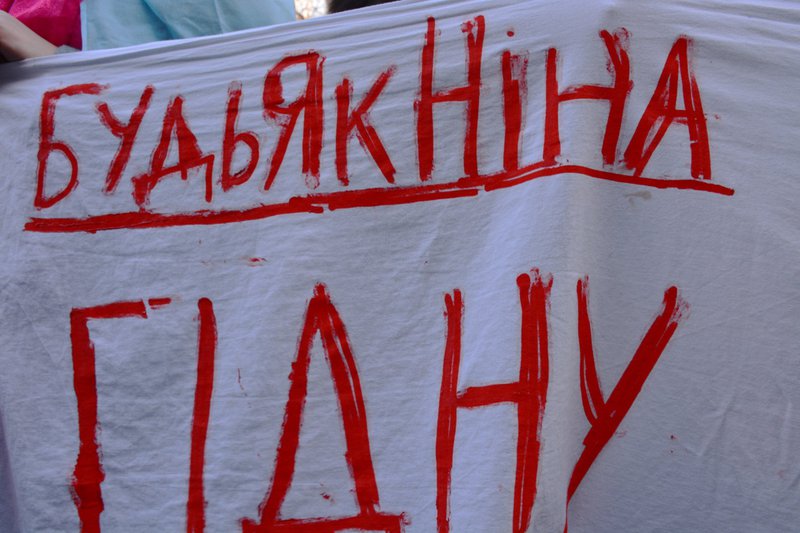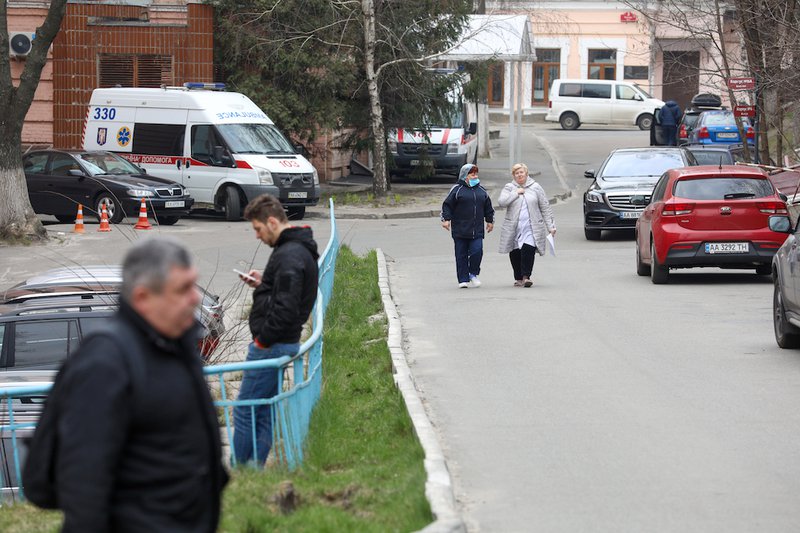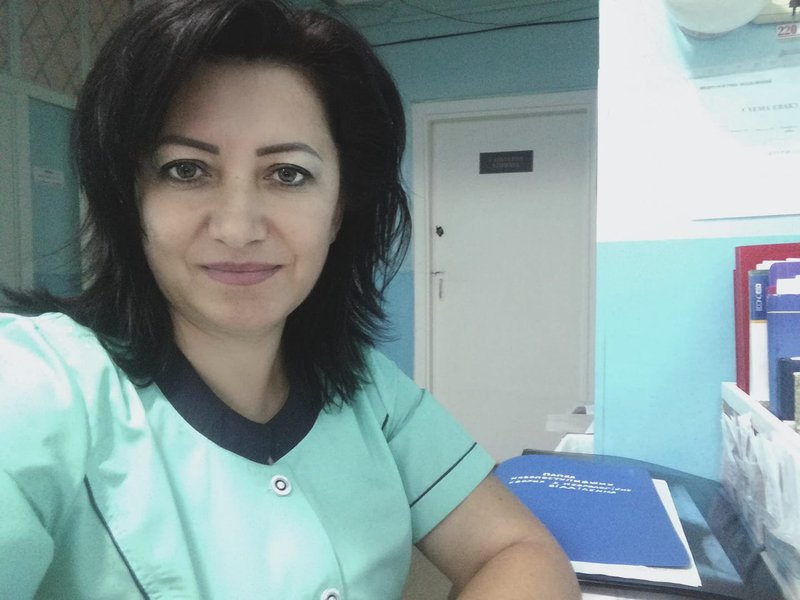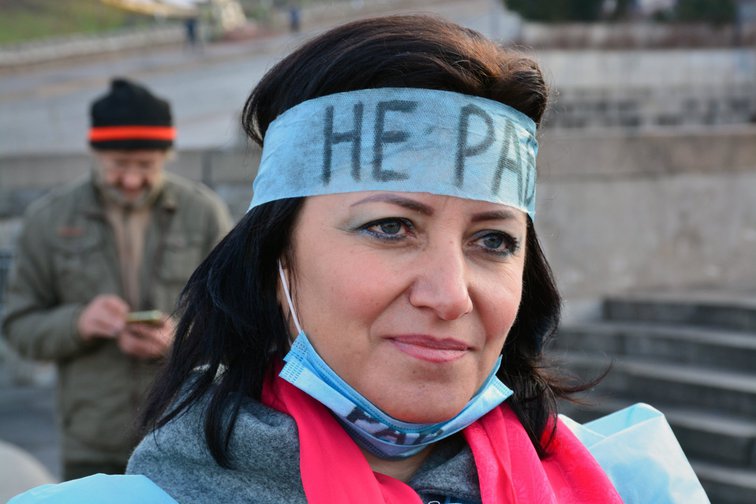A Brief Colonial History Of Ceylon(SriLanka)
Sri Lanka: One Island Two Nations
A Brief Colonial History Of Ceylon(SriLanka)
Sri Lanka: One Island Two Nations
(Full Story)
Search This Blog
Back to 500BC.
==========================
Thiranjala Weerasinghe sj.- One Island Two Nations
?????????????????????????????????????????????????Wednesday, December 16, 2020
“Be like Nina”: how a Ukrainian nurse organised a protest movement
Low wages, stressful conditions and little hope in the future of Ukraine’s healthcare system – this is what Nina Kozlovska, a nurse at a Kyiv regional hospital, is campaigning against.
It took only 24 hours for Nina Kozlovska’s post to go viral.
“One night I came home from work, opened Facebook and wrote everything that was in my soul: how we work, what our conditions are, what the wages are,” Kozlovska says.
Under the hashtag #BeLikeNina, medical workers all over Ukraine shared the nurse’s post – and in kind opened up about their own stories of overwork and underpay inside the country’s healthcare system.
Since that Facebook post in November 2019, Kozlovska has helped bring together medical workers to protest the closure of hospitals and staff cuts, and is proposing parliamentary hearings over Ukraine’s healthcare reform to be held together with healthcare workers.
Ahead of another protest on 16 December, openDemocracy interviewed Nina Kozlovska about her work, the challenges of the COVID-19 pandemic, protecting the rights of Ukrainian health workers and attempting to set up an independent trade union.
We present the interview as a monologue, which has been edited for clarity.
“The workload has increased, but the salaries haven’t changed”
I am a nurse, I have the highest qualification possible and 25 years of experience. My monthly salary is 3,841 hryvnia [about $135]. With extra payment and after taxes, I take home somewhere between 4,500-4,700 hryvnia per month [up to $165].
For my flat – and I live with my son and raise him myself – I have to pay 5,000 hryvnia plus utilities [about $200]. This is more than my salary. Therefore, after finishing my shift as a nurse, I run to my part-time job – for example, setting up people’s IV drips or doing injections at home. I also do odd jobs at weekends. My parents live in the country and help me out with homemade vegetables and fruits. That’s how we live. If I only worked in the hospital and if no one helped me, it would be simply impossible to survive.
"I believe that today’s salaries for healthcare workers are shameful for Ukraine. The medical profession is considered one of the most important, and yet it’s one of the lowest paid"
When I first started working at the hospital, there weren’t enough nurses in the neurology department. And they took me on instantly. Then I realised why. Because this department is very difficult, one of the most difficult. There are patients who have suffered strokes, and they need special care.
Our salaries have always been low. But at least the prices for food and utilities used to be lower, and we could survive somehow. Thanks to inflation, prices for everything went up, but wages have remained the same. Our department always had a shortage of nurses, so we had to work harder. Now there are even fewer nurses – the others saw that the workload has increased, but the salaries haven’t changed. Therefore, many began looking for better salaries in private clinics or abroad.
I believe that today’s salaries for healthcare workers are shameful for Ukraine. The medical profession is considered one of the most important, and yet it’s one of the lowest paid.
“There weren’t many of us, but this was the first time”
One night I came home from work, opened Facebook and wrote everything that I was holding in: how we work, what our conditions are, what the wages are. How long can we take this? Maybe we shouldn’t be quiet any more, maybe it’s time to talk about our problems in public? To be honest, I was shocked when I woke up the next morning – in one day my publication had more than 24,000 reposts. It became clear that it wasn’t just me who was feeling this, but all healthcare workers.
So we started messaging one another. We came together and created a Facebook group, which now has 63,000 members. I suggested holding a protest near the Verkhovna Rada [Ukraine’s parliament], and on 19 December 2019 we did it, and since then we began our little struggle. There weren’t many of us, about 100 people, but this was the first time –healthcare workers have never held a protest like that before. [While Ukraine’s official healthcare trade unions have held protests before, this was the first grassroots medical worker protest - ed.]

We raised the issue of salaries at the protest. Mykhailo Radutskyi [head of the Ukrainian parliamentary committee on health] came out to us and promised a wage increase. “Everything will be fine, just wait a bit,” he said. But a year has passed, and my salary has grown by only 500 hryvnia [approximately $17], though they said that we should start receiving 800 dollars a month, like in other countries.
In February, we held a second protest – this time about the medical reform. About 200 people came out in Kyiv, and even more in Lviv. In 2018, the Suprun reform was launched [Ulyana Suprun was acting minister of health until August 2019]. Then the government changed, but the reform was never properly planned out. How is it going to end? It was planned to reduce the number of hospitals: at the moment, tuberculosis, epidemiological and psychiatric services are being destroyed.
Hospitals have become inaccessible to people living outside city centres. There are problems with delivering emergency patients: this hospital won’t accept them, that one is closed. We have suggested that the reform be reviewed with the help of the medical community. Unfortunately, we were not heard.
“In some hospitals, people who actively speak out about problems are bullied”
In the beginning, even people from the medical community treated us with distrust and suspicion. All sorts of rumours were circulating. People said that we had been set up with the help of some politician. People asked who pays me. It was painful. If you write the truth, fight for justice, then surely, it seems, someone pays for it? But over time – after we got to know each other, started meeting, they saw that we really are from the people and there’s no one “behind us”.
When the pandemic began, and patients started being placed in our hospital’s infectious diseases department, we were told that there were no masks. “Buy and sew them yourself,” we were told. I went live on Facebook and raised this issue. And our infectious disease specialist wrote that she had not been given a protective suit. People shared these posts, and thanks to this, volunteers began to help us. At the beginning of the pandemic, volunteers were providing 80% of our equipment.
Sometime after this broadcast on Facebook, I had a phone call from the police. They said that I had received a letter from the Security Service of Ukraine [SBU]. The director of the hospital had complained that I was “spreading false information”. I explained everything to the policeman, one person to another. He laughed and that was the end of it.
"In some hospitals, people who actively speak out about problems are bullied. They are intimidated and threatened with dismissal if they don't shut up"
Over time, patients with coronavirus began to be accommodated in two other departments at our hospital. In one of them, nurses began to fall sick. And at that time I was actually on vacation. And the deputy chief physician asked me to go to work in this department. I never refuse, especially when there is no one to work. I stopped my vacation, worked with coronavirus patients for a month and was ready to continue doing so. On the one hand, as the head of a healthcare movement, I was interested in doing this work. On the other, to be honest, I needed the extra money to bring my wages up a bit [Ukraine’s health ministry introduced a 300% raise to medical staff working with coronavirus patients]. But although there were still not enough nurses in these departments, the director didn’t allow me to work there. I understand why. Just to hit my pocket, so I didn’t get the extra money. He understood that I needed it.
This is how I’ve had pressure for my activism – either through the SBU or over additional payments. In some hospitals, people who actively speak out about problems are bullied. They are intimidated and threatened with dismissal if they don't shut up. “You don’t like something, write your resignation right here” But I fulfil my duties, I know my rights. And so I’m not scared.
“We cannot prove that we were infected at work”
Our healthcare system was not at all ready for the coronavirus pandemic. The salaries had not been revised [in recent years], although the workload increased. Cuts have started, even though there are not enough medical staff.
I received extra pay for a month of work with coronavirus patients without any problems. But this was not the case for everyone. Medics were promised a 300% co-payment. But they didn’t receive all of it, since [in the process of healthcare reform] local non-profit enterprises were set up, and the directors were given the right to independently manage money. As my colleagues told me, some people were paid 100% or 200% extra, elsewhere the money disappeared altogether. Even in the regions they tried to deceive us somehow.
A lot of healthcare workers are sick with coronavirus, mostly medium-level infections. They treat themselves at home, at their own expense. Although there is now insurance and coronavirus is recognised as an occupational disease, it still needs to be proven by a special commission. It’s claimed in some hospitals they pressure medics: “Either quit, or write that you got sick outside the hospital.” Or the commission itself meets and decides that a medical worker fell ill outside the workplace, so as not to pay them compensation. That is, it’s not only that we have low salaries, we also don’t have any form of protection. We cannot prove that we were infected at work, even though we are working with coronavirus.

This work is hard. Next year, the healthcare budget may be less than this year. The medics are very disappointed. Young people are thinking about moving to the private sector or going abroad. If from next year the government doesn’t think seriously about the healthcare system, Ukraine may be left without doctors, and patients – without help.
“Pay your dues and get a present at New Year”
There are trade unions within hospitals, including ours. But we don’t even know who set them up or when. We didn’t even have any kind of meeting. I remember one day a senior nurse came in and said to everyone: “Here is your application, please fill it out to join the trade union. If you don’t do it, you will be fired.” I said that I wouldn’t join, and the other nurses refuse, too. This is the right of everyone, they cannot force us, and it is illegal to fire us. This trade union was created not to protect doctors, but the director himself. And that’s the case in most hospitals. Just like the national trade union: pay your dues and you get a present at New Year. Everyone is already laughing at this.
We wanted to create an independent national trade union in order to defend our rights. Unfortunately, we didn’t succeed, we were refused. Formally, they said we put the comma in the wrong place, the application form has changed, or there’s a delay due to quarantine. Then they refused us again after they found some mistake, even though a lawyer helped us. But I think that they simply did not want to let us through, because it would be unprofitable for the authorities and the existing trade union.

Therefore, we decided to do something else. A month ago we registered the “Be like Nina Medical Movement” as a civic organisation. Now we can officially submit appeals, and they have to answer us. But we will still try to create our own trade union. Then, perhaps, we will organise regional trade unions and a national organisation.
“I belong in the medical profession”
Everyone asks me about motivation. Even my parents say: “There’s so many problems, you fight for everything and don’t achieve anything. Give up that job, find a decent one, even at ATB [a popular supermarket in Ukraine]. Cashiers get 12,000 hryvnia [$420] there.”
I am 46 years old, and it’s probably too late to go abroad. On the other hand, I am a principled and fair person. I really like the medical profession, I belong in it. I like working, talking with people, comforting them not only with medication, but also psychologically. And so I think: why should I leave Ukraine? Maybe you need to fight in order for everything to work out, for a normal healthcare system? And I ask my colleagues to fight for this, to respect themselves. My colleagues support me. Unfortunately, there is still fear. And this is the main problem – a consequence of having been intimidated for years.


